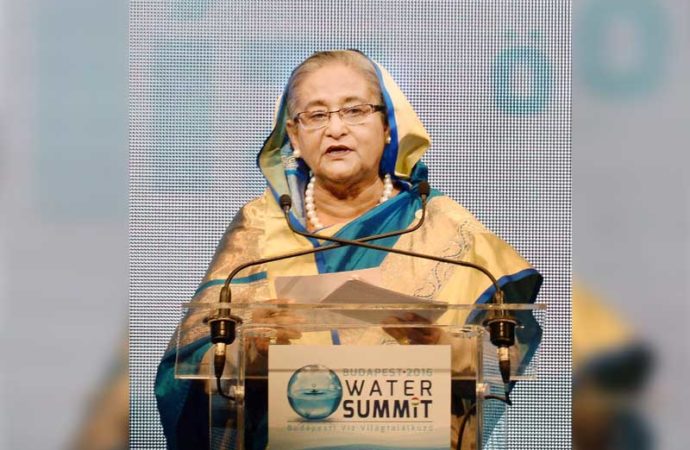Hasina seeks comprehensive global efforts for water management

Speaking at the inaugural ceremony of Budapest Water Summit 2016, the prime minister laid out a seven-point agenda to help attain the goals adopted by UN High-Level Panel on Water. Prime Minister Sheikh Hasina on Monday sought comprehensive global efforts for water management and urged world leaders to prioritise water issues in their policies and actions, laying out a seven-point agenda for the scarce resource. “We must work together [for water management] and act now… Bangladesh is committed to playing its role in this regard,” she told fellow heads of state and government at the opening of Water Summit 2016 in the Hungarian capital of Budapest. The Bangladesh premier particularly laid emphasis on charting an appropriate policy on sharing trans-boundary waters. “Scarcity is not the main cause behind the persisting water crisis; the problem is also linked with equitable distribution,” she said. “(So) the effective management of trans-boundary river water is very important.” However, as the head of government of a deltaic country which has 230 rivers, of which 54 are cross-boundary, Sheikh Hasina acknowledged that sharing of cross-border river flows is a “complex issue”. “Water occupies a central place in our culture, ethos, lives and livelihoods,” said the premier, who is a member of the UN High Level Panel on Water. The prime minister said actions based on her proposed seven-point agenda might help attain the goals adopted by the High Level Panel on Water during the UN General Assembly in September.
PM Sheikh Hasina’s seven-point agenda
1 – Water should be the integral part of any development endeavour at national, regional and global levels as Agenda 2030 have sufficiently articulated the interlinks and interfaces between water and wider sustainable development architecture.
2 – Special focus needs to be paid to people or groups who are usually left behind, as millions of people around the world face difficulties to access safe drinking water and basic sanitation.
3 – Resilience must be built against water-related disasters, as water is one area where climate vulnerable countries are intensely challenged.
4 – Effective management of trans-boundary river water is very important as scarcity is not the main cause for persisting water crisis; the problem is also linked with equitable distribution
5 – Water is extensively used for agricultural development and food security, efforts should continue to develop less water-intensive varieties of crops and water efficient technologies.
6 – Every country needs to share ‘lighthouse initiatives’ with other countries to further develop knowledge, capacity, skill and technique in terms of development and efficient use of water resources
7 – A global fund on water is needed to support research, innovation, technology transfer to realise the water-related goals and targets.

